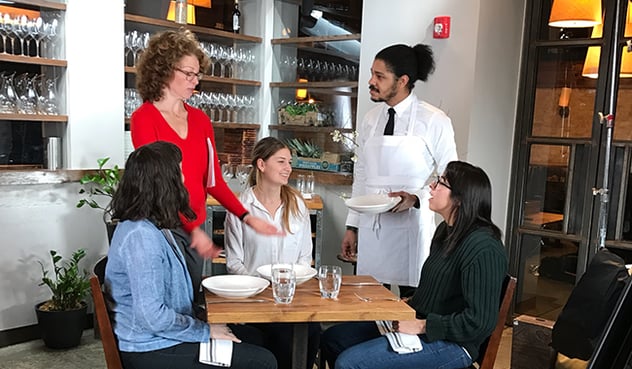Even during a hectic and unpredictable hospitality shift, it’s fair to say your employees complete the same habits every day.
If they’re a server, they’ll go through the normal motions of setting tables, greeting customers, taking orders and delivering food. When things are busy (which they usually are, right?), they may feel like they’re too under the pump to even consider seeking out new skills on top of all that.
But they could also feel that way because they’re picking up on the attitudes of your business. If your venue appears more concerned about getting through a shift than nurturing its employees, then maybe they think you don’t care about their development – and that they shouldn’t bother caring about it either.
So how can you let them know that you want learning to become a part of their daily routine, without making them feel overburdened? Here are a few small things you can do to encourage daily learning habits in your employees.
1. Keep it positive

This might sound like a vague first step, but it’s a really important one. When your team are feeling strained, it’s going to be very hard for them to care about learning new skills. People under stress just revert to survival mode – they put their heads down and focus on getting through the day. They don’t want to take on new responsibilities.
 You need to show your team you value their mental and physical wellbeing before they’re going to be motivated to work harder. Make sure you’re doing those small but crucial things that tell them you care – ask about their weekend, make sure they’re taking regular breaks, give them a pat on the back for a job well done. Here are some tips on reducing stress that you might like to share with them.
You need to show your team you value their mental and physical wellbeing before they’re going to be motivated to work harder. Make sure you’re doing those small but crucial things that tell them you care – ask about their weekend, make sure they’re taking regular breaks, give them a pat on the back for a job well done. Here are some tips on reducing stress that you might like to share with them.
Understand where they’re coming from as well, and respect that. Many of your staff will be students who have no aspirations to work in hospitality permanently, and that’s okay. That doesn’t mean it’s a waste to invest in their development. Customers can tell when employees are bored or unhappy in their role and this will affect their experience at your establishment, translating into poor reviews and bad word of mouth. So it’s up to you to create an environment where anyone will want to thrive.
2. Cater to their interests
What’s the best way to get someone excited about learning? Find out what they want to learn. Put a suggestion box in the staff room so they can share ideas anonymously. In addition to empowering them to become more involved in their own learning, this will also help you pinpoint skills shortages in your business, without drawing attention to specific individuals.
There are a lot of ways you can cater to their suggestions. For example, if you have several people asking to improve their wine knowledge, you could host a staff tasting before a shift. Or if it’s in the budget, you could even take them on a field trip to visit one of your suppliers. Once a year, The Green Table and Table Green Cafe in New York close down so their staff can take a free trip to the farms that provide their seasonal produce. In the words of the restaurants' founder Mary Cleaver, it's a chance for them to "connect to each other and where our food comes from."
3. Encourage them to read

While not all of your staff will be voracious readers, many of them will be. And it’s a great thing to encourage for personal development. Reading helps with knowledge retention, and exposes us to fresh and exciting new ideas.
Start a free book library where your team can trade useful and interesting books about topics like food, beverage and leadership. Get the ball rolling by supplying the first few books, but ask them to bring in their own as well.
It’s also worth encouraging your team to read online. Create a team Feedly account so they can keep up-to-date and inspired by the same blogs, publications, YouTube feeds and Google News Alerts. Feedly is very simple to set up – you just enter the URLs of the various websites that you want to follow, and then you can sort them into different folders (for example you could create a Customer Service folder for servers, a Wine Skills folder for sommeliers or a Bar Skills folder for bartenders). These lists will self-update every time the websites publish a new resource, so once you’ve set up the basics, you don’t have to do a thing.
Sign up for an individual account for free, email the login details out to your staff members, and then suggest that they login weekly to browse the content. Make time to talk about what you’ve all read in a pre-shift meeting, so you can share your reactions and observations.
4. Start a private Facebook group
Apparently the average person spends 50 minutes a day on Facebook. 50 minutes a day! To put that into perspective, that's almost as much time as we spend eating and drinking (1.07 hours).
So considering the odds are good that most of your staff will be on there, you might as well reach them where they live! Set up a private Facebook group as a kind of team forum. These groups are a fantastic way to build a sense of community between people. Encourage staff members to use it as a space to share ideas, articles, recipes, books and podcasts. 8Hotels have a public team page where they share photos and articles to boost each other up, and employees clearly have a lot of fun there.
5. Quiz and reward
There’s a reason they make you take so many tests in high school – it’s because there’s a very clear correlation between tests and knowledge retention. Apparently students who use other study methods, like re-reading notes, highlighting key passages and attending study groups, don’t remember things over the long-term as well as students who are regularly quizzed on topics.
That doesn’t mean you need to start setting written tests for your team or anything like that! But consider incorporating fun little pop quizzes into your day-to-day – and reward staff for participating.
For example, once a week you could hold a flash quiz during a pre-shift meeting to test your team’s knowledge of your menu. Keep track of the winners on a leaderboard in the staff room so you get a bit of healthy competition going, and then reward the winner at the end of the month with a meal voucher or a free bottle of wine.
Everyone who participates in the quiz – even those who are more passive and just listen – will have a better memory of your menu because of the repetition. And they’ll have fun along the way.
6. Give them access to learning tools

Sometimes you just won’t have the time to prepare activities for your staff meetings, and you can’t beat yourself up about that. But you can provide your team with tools to empower their own learning.
If the rise of Netflix has shown us anything, it’s that people crave the flexibility to do things on their own terms. Universities around the world are introducing eLearning into their curriculums in order to cater to this need for self-directed learning.
There are online hospitality training platforms that you can use in your business (like Typsy), that allow your team members to absorb short courses in their own time. These platforms also give them the freedom to branch out of their comfort zones and explore other (related) subjects that interest them – feeding their passion and commitment to the industry.
7. Invite your industry friends to wow them
During your years in the industry, you’ve probably developed a strong network of hospitality contacts, from celebrated chefs to successful business owners. To a novice just starting out in the hospitality industry, there is nothing more inspiring than hearing from those who have succeeded. Just think about how excited the MasterChef contestants get every time they bring in a new celebrity chef!
So let your team benefit from your networks. Invite these contacts to come in and share their knowledge with your team during a special workshop. Your employees will quickly recognize that you’re offering them a rare opportunity to learn from the best, and they will reward your generosity with their loyalty.
After all, our industry is built on the concept of hospitality – and we need to extend that to our workers as well as our guests!
Did you find these tips valuable? Why not share this article with your contacts on LinkedIn?
You might also like